Cambodia is a scam capital of the world. Sure, Nigeria may be the first thing that comes to mind when talking about scam, but Nigeria focuses on on-line scamming, whereas Cambodia is still on top of the game when it comes to face to face scams. Just as is the case with violence, scam is a part of daily lives of all Cambodians. They need scam to feel alive and no walk of life is left out.
Scamming Government Officials
Cambodia is ruled by the most corrupt government in the world which results in all government officials being professional extortionists. Whether it’s the police, Apsara Authority or immigration people appointed to issue visa, they will all want extra money if you end up having any dealings with them.
Poipet Border Scam
Poipet border between Cambodia and Thailand is infamous for endless scam and indeed I have been subjected to it when I tried to cross both to Thailand and back from Thailand to Cambodia. Thais do not scam, but Cambodians make it their profession. Buses will purposefully take you to the wrong place so you have to pay extra to get you to the border or to stay overnight in a guesthouse that pays commission. On the way to Cambodia you will have Cambodian immigration officers and the police insisting on bribes or else you’re left to sweat and roast in the sun until you shell out. This type of scam is not limited to Poipet through. Coming to Cambodia from Laos will expose you to the same scam and so will the Cham Yeam crossing from Thailand (direct access to Sihanoukville).
Planted Drugs Scams
Given that the police are as corrupt as the government itself, their entire purpose is to scam. The police will go through any lengths to get money off of tourists. Planting tourists with drugs is a common practise and could set you back a few hundred dollars unless you shell out right after you’ve been set up. In that case, the scam cops may be happy to let you go after being paid just $20 each.
Fake Pills Scams
I understand that UCare Pharmacy (can find one in both SIem Reap and in Phnom Penh) is supposed to be the one pharmacy in Cambodia which doesn’t sell fake pills, but it’s hard to take any such claim by a Cambodian company seriously. Other than UCare, though, Cambodia specializes in selling fake pills cause that’s an easy money. One type of pills worth particular mention are anti-malarials. When news of fake malaria pills hit the web, I was not surprised at all when I found out that Cambodia was the front runner of the scam. It’s so typical of this country to sell counterfeit pills to people who foolishly believe they will be protected against malaria… Don’t trust anything you buy in Cambodia, but if your life is in question, then multiply this rule tenfold.
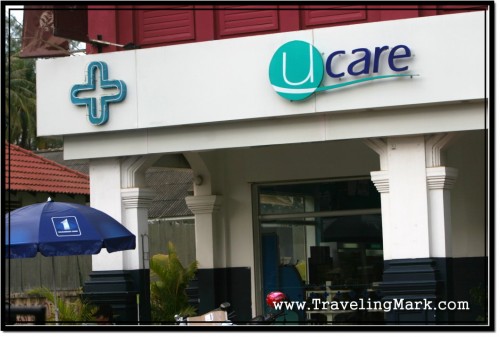
Rental Scams
This usually happens with motorcycle rentals as there is more money involved than in bicycle rentals for example. The scenario is simple – you come to rent a motorcycle, sign a rental agreement which has a clause that you will have to pay the full amount if you lose, destroy or someone steals the motorcycle. You will be provided with the key from the lock while a copy of the key is provided to a person associated with the rental agency. They will follow you from the distance, patiently waiting until you park the bike before the superstore or some other place where you’re likely to step away from the sight of the motorcycle for a while. They will use the key they have to unlock the motorcycle and will drive away. When you come back, there will be no motorcycle and no chance for you to recover it. The police are often part of this scam and will participate with the rental agency to force you into paying the full amount that equals the value of a brand new bike. Many, many and then some foreigners have been scammed this way in Cambodia. Again, businesses in Cambodia don’t try to make it by offering quality service or product. They just look for easy and quick money, and as much as possible the first time.
Bootlegs Scams
Virtually nothing you buy in Cambodia is genuine. Nothing is real. By selling genuine goods the businesses would have to work hard to build up their reputation and customer loyalty and who can be bothered with that? They are simply too lazy to do deal with real business model, so instead they focus on an easy solution – theft. As a result, you will find bootlegs of anything you can imagine sold right on the main streets of every town with store windows displaying all bootlegged items with spotlights on. They have entire stores specializing in selling bootleg software, bootleg movies, bootleg music CDs, bootleg you name it. Cambodians simply like to steal and make money by selling stolen goods.
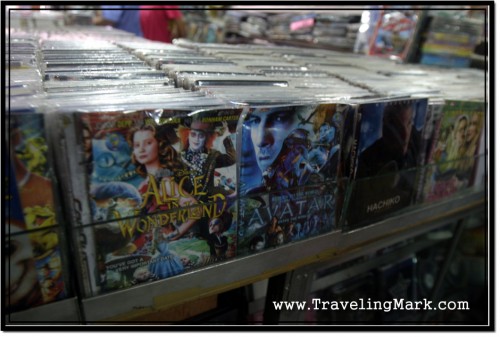
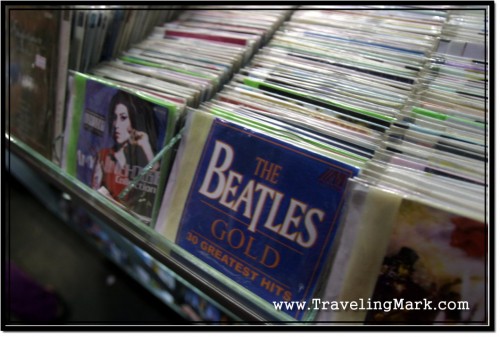
Pirated Merchandise Scams
Theft of intellectual property and trademarked names is the name of the game in Cambodia. It starts with photocopied Lonely Planet and National Geographics books being sold on the streets by touts, and ends with sales of fake Borderline suitcases, Gappa wear or Nike shoes. I don’t even understand how they go about selling fake iPhones and other electronic devices, but if you think you’re buying a genuine product here in Cambodia, you’re in for a big surprise.
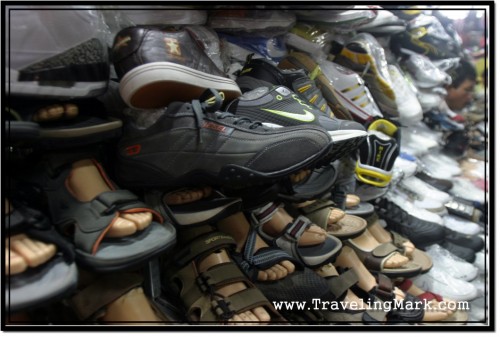
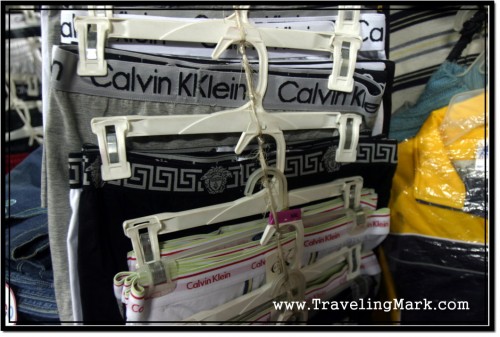
Internet Cafes Scams
Be very careful when using internet cafes in Cambodia. Many have keyloggers installed on their machines to steal your passwords and other valuable information. People have seen money transferred out of their accounts following the use of internet cafes in Cambodia.
Repair Scam
If an electronic device breaks down on you in Cambodia, don’t be silly and try to have it repaired there. Wait until you get to a civilized country, otherwise you’re standing a chance of getting your machine ripped off genuine parts and have inferior, generic parts put in instead. Again, this is Cambodia. Any way they can scam you, they will.
Gas Station Scams
If you are new and don’t pay attention, you stop at the gas station to throw some gas in your tank but the attendant will purposefully not zero out the counter so you will end up paying for the balance of the precious customer, on top of the gas that went into your gas tank. Always make sure the counter is reset before the attendant starts fuelling.
Police Check Stop Scams
Cambodian police just love foreigners riding around on motorcycle. They will pull you over and fine you with… something. It could be that you had a headlight on during the day, or that you turned left or whatever else they can pull off. All traffic infractions have set fee schedule which is usually around 2,000 Riel (roughly $.50 US) but the cop, if they see you don’t know this, will throw something totally outrageous at you – such as $50. If you are able to bring it down to $20, you will feel like you got off easy, yet you had just paid 40 times the amount you should have. Fines for common traffic offences are less than a dollar. Always ask for receipt by saying “sombot”, otherwise insist on going to the police station and calling the embassy to have this handled. They will likely not want to sacrifice their time dedicated for ripping people off by false fines with this and may let you go.
Fake Jewellery Scams
Unless you are an expert on precious metals and precious stones, don’t ever buy any jewellery in Cambodia. Remember, nothing you are being offered is real and unless you know your stones and metals really well, you’re gonna end up buying a chemically produced worthless junk. If you know what you’re doing and can take the risk of having your life put in stake, then rejecting the fakes and insisting on getting the real deal could land you with the real deal, but you’ll be looking for trouble with this approach.
The Ratanakiri province is riddled with mines containing precious and semi-precious stones. It is a great place for experts to go get some valued stones for cheap, but unless you know what you are doing, you’re gonna end up buying a fake. Cambodians will do their best to first ensure they’re selling you the fake and unless you show them that you know your stones backwards, you will have little success scoring a good buy.
Pailin area (homeland of Khmer Rouge) is also known for rubies and sapphires but as it is with Ratanakiri, unless you know your stones, don’t buy anything or you’re gonna end up with a chemically-treated copy.
Helpful Locals
Helpful locals are the most frequent and most potent type of scam in existence. They will offer to negotiate a better price on your behalf because you can’t speak Khmer but will instead negotiate a hefty commission for themselves in exchange for cheating you into paying the price they told you was the best you can get for this item. I got this right away after the Tuk Tuk driver offered to “help” me negotiate the best price for a bicycle. If I followed his help, instead of paying $30, I would have paid $185. Helpful locals are never helpful because they want you to feel good about visiting Cambodia. They only and solely want to help themselves and are only pretending to be helpful because that’s what will get them to scam you.
Local Business Scams
The name for local businesses is “discrimination”. Cambodia is all about us vs them. If you look different, you will be subjected to discrimination. You will be treated like a crack whore by the Tuk Tuk drivers yelling at you and clapping their hands from across the street while market people will make a point of overcharging you just because your color of skin is different. There are a few businesses with clearly posted prices which apply to everyone equally. As someone who doesn’t support discrimination, I stuck with shopping there, instead of with local businesses. Scamming me just because I look different is not my idea of a good business practice.
NGOs and Orphanages Scams
NGOs and orphanages are some of the most profitable business ventures in Cambodia. There is no middle class in Cambodia, only 12 million of extremely poor people and a handful of extremely rich ones. There is a hefty group of those in between, though. They ride Lexus SUVs and honk their horns at everyone to make way. Those are the NGO owners who came to easy riches by establishing NGOs. Through foreign donations none of which made it to the people in need, they were able to secure themselves with above average lifestyles. They often use fake orphanages as storefronts to make foreign donors feel sorry for the impoverished kids and send some money over. This money is used to finance outlandish lifestyles and expensive cars of the NGO owners. This is one extremely successful scam that yields insane and easy revenue.
Fake Monks
When it comes to Cambodia, the locals will stop at absolutely nothing to scam you. They will also dress up as Buddhist monks because those usually enjoy a great deal of respect and it is easier to lure money out of unsuspecting victims when your head is shaved and your body wrapped in an orange robe. Fake monks exist all over Cambodia but the more touristy the area, the higher a density of them.
It is not a secret that monkhood (is there such word?) is the shelter for criminals who would otherwise face repercussions. Joining the ranks of Buddhist Monks saves the delinquents from punishment which is abused by the lot of them. That’s why you will see the monks behaving in the ways monks should not behave – you will see them drinking and smoking, browsing porn in internet cafes, rubbing it up with bar girls in karaoke restaurants and stealing valuables from the pagodas so they can sell them for personal profit. You can tell who’s in it for the right reasons and who’s not.
If you get approached by a monk and asked to make a contribution either to the pagoda or towards his studies, you are likely speaking with a fake monk. Real monks don’t approach strangers like this directly. You will see them making their rounds every morning which usually consists of standing silently in front of businesses or homes and waiting for someone to come out and make a food donation into their alms bowl. They will wait silently for a minute or two and if no one comes out, they will move onto another house. This is their standard morning ritual.
Keep in mind that because someone is ordained, it doesn’t mean their natural greed and habit of getting hand-outs goes away. This is Cambodia. Cambodians do not like to work, they like to get stuff for free and draping oneself in a saffron robe doesn’t wipe their natural selves clean.
The saddest part about Cambodian Buddhist Monks is that they are Cambodian. That means that all head monks are as corrupt as the rest of the country. Anyone who’s in a leading position in Cambodia is corrupt, including religious leaders. Money that the temples generate through donations and other contributions usually end up in pockets of those corrupt head monks so even if there is a new monk with the right intentions looking to change the world, they will soon be defeated by the corruption that deeply penetrated all walks of life, including religion.
Considering that Cambodia is a Buddhist nation, the number and omnipresence of scams is unnerving. Shouldn’t they think of Karma, you ask? I was asking the same thing myself and can’t explain it in any way other than by calling them “hypocrites”.
Cambodians don’t believe in building up on the name of their business by offering quality product and/or service. They strictly focus on ripping each customer off as much as possible the first time they attempt to make a purchase to boost the initial score to the max, even if it means that the customer will never come back. There is also an ongoing currency exchange scam but that only results on about 5 cents loss on every dollar and usually doesn’t end up making a significant impact on your budget. It is truly saddening that Cambodians don’t see and don’t treat tourists as people, but as wandering cash cows. Their smiles so many people talk about are fake. They force them upon their faces because that could engage you into an eye contact which for a Cambodian is an invitation to sell you something or entice you into falling for one of the many scam they’d mastered.
Seeing how Cambodia is a major scam operation, I was not surprised when I found out that “Seeing Hands” massage by the blind did not have any blind people doing the massage, but they were good at pretending to be blind. It was nothing more but a marketing gimmick combined with a scam to generate more interest in the business. Foolish foreigners believe they are supporting the blind yet they are simply supporting scammers. This is real Cambodia!

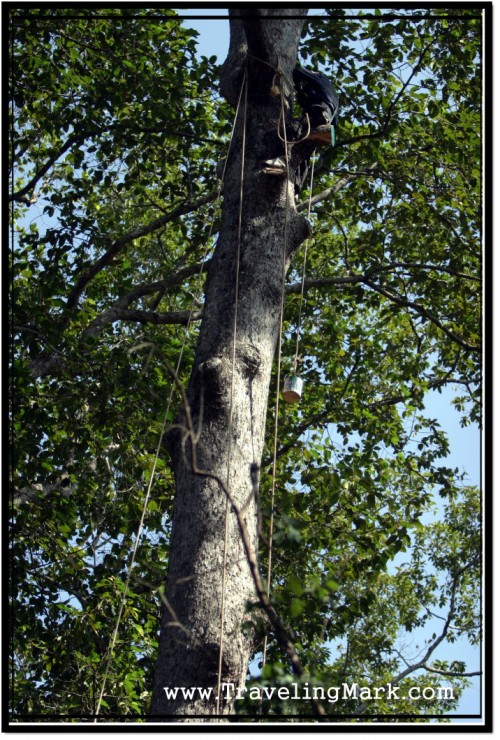
i’ve confirmed that D’s Books and other stores around siem reap cambodia are selling books that were sold to them by directors of ngos who received the books as donations to the children in their care. the first two signs are: 1. a rubber stamp in the cover of the book, “NOT FOR SALE, donated by….” in this case “Room to Read Cambodia.” 2. a library check out sticker. which means that a voluntourist brought the book to donate in cambodia, and after they left, the recipient sold the book and put the money in his pocket. HIS in capitals. i have never met a woman who directed a corrupt ngo here, after 3 years in the field. please see more details at: https://sites.google.com/site/firebugpenalty/scambodia/d-s-books
Thank you for brining this to D’s Books attention. The children’s books you refer to were on the kids table as the result of a simple mistake by one of our staff and have now been returned to Room To Read. D’s Books is now in ongoing discussion with Room To Read as to how we can best supply them with books for NGOs and how we can work together to stop donated books ending up in the wrong hands. Both D’s Books and Room To Read would like to stress that there is no scam here, simply a mistake, and if anyone concerned by this matter would like further information both D’s Books and Room To Read are more than happy to answer your questions. Regarding books with library check out stickers, it is a very naive assumption that these books must have been donated. Libraries, unfortunately for all, close their doors fairly regularly around the world nowadays and, in order to recoup any losses, it is common for libraries to sell off their stock to wholesalers etc. These books can then make their way to any small independent book shop anywhere in the world through bulk buys, wholesale job lots, mixed pallets, travelers trading or selling the books etc. There is certainly no scam involved here, as neither there is a scam involving D’s Books and Room To Read. While both I and Room To Read would like to thank Mark Moore for letting us know that donated books had mistakenly made it on to D’s Books shelves (and to put this in to context we are talking about 18 copies of just one title, the only instance of this happening in D’s Books history) , we would also like to ask him to be more responsible with his work as, while trying to do a good thing, assumptions and refusal to meet with D’s Books or Room To Read has led to Mark basically make a number of false accusations and ultimately loosing credibility.
I also purchased several new Sipar series books at Preah Vihear book center on road 6, and later found that they were originally purchased by an NGO for a school in Siem Reap, and then resold to the bookstore. The rubber stamp of the European NGO was still in the cover, not scratched out like some of the books at D’s Books. The difference with the books at D’s was that each book had two stamps, one of which was the recipient NGO, which I know well, and so I was able to follow up with them (room to read.) After some research I realized that this resale of donated resources is so commonplace and widespread that attempts to document or prevent it are futile. The feedback is nearly unanimous: savvy NGOs don’t “donate and run” in this climate of accepted corruption. Rather they use other strategies to benefit people in need, more directly in ways that are not so easily abused and exploited. It is a dramatic blunder to donate to an NGO in cambodia or one outside that donates to another NGO here. As for D’s, it’s a used books store and I regularly found library books for sale there with the checkout form still glued inside the cover. This is an economy where people struggle to make money. I don’t blame people for taking advantage of opportunities. It should inspire sincere NGOs to rethink their plan and be smarter. But most of them still “donate and run.” They’re not diligent and we should not be surprised by the result.
After reading about all these scams, it becomes rather hard to believe anyone pretending to be honest or to have made an honest mistake (it would seem to be the most logical defense once found out scamming). I am also aware of what an uphill job it becomes to defend/protect your good name and reputation for an ethical person, in this society.
I was drugged and robbed in a tourist bar in Siem Reap by a Cambodian prostitute.
I have traveled many places and know about all the common scams and how to protect oneself and generally consider myself to be a fairly savvy backpacker. I knew about the fake visa center and fake tourist buses at Poipet. I negotiated fair prices for transportation and lodging to Siem Reap. I went to a popular tourist bar right in downtown. It was very clean and full of tourists, seemed like a safe place to have a few beers. I noticed a few young girls at the bar who seemed to be alone, I didn’t pay too much attention though I was certain they were prostitutes. The last thing I remember is sitting at the bar minding my own business. I woke up hours later lost in the streets and totally out of it. My money and iPod had been stolen. Fortunately a tuk tuk driver took pity on me and brought me to my hotel. The whole next day I was totally out of it, I couldn’t even talk or think straight. It was terrifying, I really thought I was going insane. It had nothing to do with alcohol either, it was some kind of drug. Fortunately by that night my head started to clear. I have a very vague memory of being in a room with a woman which is why I suspect it was one of the prostitutes at the bar who drugged me. Cambodia is a beautiful country but please be careful there. No matter how smart you think you are the sheer number of scams and scammers there make it likely that at least a few of them will be successful.
I know this post is a few years old but I would like to know how you were drugged? Many locals get drugged and robbed all the time. Many have no idea how they were drugged, just a tap on the shoulders. I wonder if it’s the same drug.
Hi ! I have been to cambodia 3 times and was scammed by well known Internet Scammer Thavra Pich AK THAVRA Choun, It was a advanced marriage Scam with the whole family involved in this in fact she has multiple facebook accounts on the Facebook with Different names.I had legal engaged with all cultural and legal protocols witnessed by the family and community . During the time we were engaged to be married I found out she was having relations with 3 different men in the time frame . From all the internet activity of scams she does she has had multiple cars during this time frame.
Why come to this wonderful country and be do critical. Sit back smile and enjoy your time here. I love it.
Could you explain a bit about your life there and how you keep safe and avoid the scams?
We’re planning a visit later next year.
Thank you for thus article…i have a plan to be there in the near future.